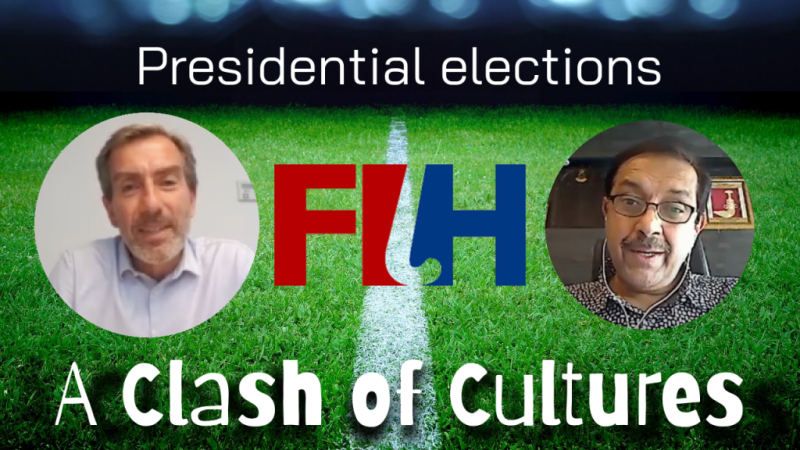On November 5 a battle between very different philosophies in our sport will be decided for the next few years, maybe decades. In short the difference can be summed up as “play for pay” vs “pay to play” or also “grow the fan base first” vs “grow the player base first”
Two very different candidates are running for the position of president of the FIH. Which is the acronym for “Fédération Internationale de Hockey”, French for the international hockey federation. But it might as well mean the federation of international hockey instead. But the article on that difference in nuance will be for another time.
On the one hand there is Tayyab Ikram, originally from Pakistan but these days representing Macau (China). On the other hand we see Marc Coudron from Belgium running as well. Both Ikram and Coudron obviously claim they want the best for their sport and its national associations. But in reality they want very different things. It is a clash of cultures. Both claim development to be their number one priority. But for both development means something very different.
Tayyab Ikram

For Ikram sport (and thus hockey) is an event product, part of the entertainment business. So when he says he wants to develop the national associations or NA’s, he means get them money from their own national olympic associations and their government. To help these NA’s fund national teams and especially their own administration. That means some players, a couple of coaches plus several administrators for each NA getting paid to show up at international events. First, Ikram claims, it’s about growing the number of fans. Because that will increase the revenue… and make sure all involved are assured a job and income.
When we ask him what his first short term priority would be as president he talks about showing the way to smaller NA’s how to get money from their government and Olympic associations
Marc Coudron

Coudron believes sport (and thus hockey) is a part of the education of your family. It’s what you do together with family and friends as a part of becoming a better & healthier person. Mens sana in corpore sano. So here it’s not about getting the most visibility with as few resources as possible. It’s about getting more people to be an active participant in their sport. Some aspiring topsport levels. Most for fun at a recreational level, as a part of the education and betterment of yourself and your children. It’s about growing the number of players because that will increase the level of education and health in your country & family. International hockey has a role in all of this, but it is a means to an end. Growing your player base first, will help grow your fanbase in a sustainable way afterwards.
When we asked Coudron about his first short term priority as president he told us development is his short, mid and long term number one priority. But in order to do this, he first needs to make sure the FIH finances are healthy again and a return to good governance culture is needed.
A clash of cultures
Therefore the election of the next president of the FIH is a choice between two philosophies…or even a clash of cultures if you will.
If I were a betting man, my money would be on Tayyab Ikram for winning these elections. The reason is simple. The FIH has 140 members (= countries with national associations or NA). Each NA has 1 vote in the elections. Regardless if you represent an NA with no playing members (as in zero… yes these exist I’m told) or one with +100K members, it’s 1 vote per NA.
At the moment we are lacking severely in transparency and accountability. Representatives of the NA’s can not be held accountable for their vote because of secret voting. The secrecy of a vote is sacred when it comes to elections by individuals. However it is a sacrilege when it comes to people voting on behalf of others (people they represent) in my opinion.
My rough estimate is some 20 of these NA’s actually have a healthy population of hockey players and in total maybe 40 also support the philosophy represented by Coudron, with a priority on growing the number of players. This means some 100 or so NA’s in my opinion exist mainly to support their administration and make sure they continue to receive money from the government and the Olympic movement. The latter are more likely to support Ikram who will try and get them their funds from national Olympic associations, without really asking them to commit to the difficult task of growing the number of players in their country. On paper yes, in real life less so. While Coudron will also do whatever he can to help them get their money to run their NA’s. But, he will also expect them to work and show proof on growing the number of players in return…
3 questions for both candidates
In my interview I asked them the same 3 questions.
- What would you like to continue?
- What would you like to change?
- What will be your first short-term priorities if elected?
Satisfy the needs of IOC at all cost
The number 1 priority for Tayyab Ikram is staying on the Olympic program, no matter what. The most important job of FIH is satisfying the needs & wants of the IOC. So he wants to continue on that path. Obviously for sports administrations that is the “easy” source of revenue. The choice that guarantees those working for NA’s and federations their income to run the sport. Other than that Ikram claims FIH is excellent in good governance & development so not much needs changing there either. He mentioned going further with projects like watch.hockey to increase the fanbase everywhere. With where possible an even stronger focus on the fans.
Healthy finances
Marc Coudron clearly is more a candidate for change. The first thing he mentioned is cleaning up the finances of the FIH, being the banker that he is in daily life. Because, especially as a non-profit organisation, you can not afford to keep on losing money year after year. He said he could turn it around and make sure the FIH would be financially healthy again within 3 to 4 years and… financially sustainable for the future.
The second thing that came to mind for him is restoring good corporate governance with an emphasis on transparency. He thinks he can manage this within 1 year in a sustainable way. But is his number one priority remains growing the number of players (= development) around the world as his short, mid and long term goal.
Ikram too talked about changing the financial model with a separate budget for his version of development. But focussed more on explaining why his strong relationship with all the big Asian sponsors would be crucial to keep finances balanced. And he wants to run the international events more cost-effectively so more money would become available for the athletes in these events.
Gender balance in the executive board
When Ikram talked change he mentioned wanting to change the executive board of the FIH. He says he is a big fan of the gender balance we are known for in IOC circles. But, he’s not a fan of this gender balance being measured in numbers. So he wants to get rid of the rules enforcing an equal number of women and men in the executive board. He prefers to focus on “capacity building” for both men and women.
So today the rule in FIH is that from 8 elected members in the executive board we need 4 women and 4 men. That will change immediately when Ikram is elected. Besides changing the rules in gender balance he wants to include more co-opted members in the executive board from other sports or walks of life to get different and challenging views instead of those who have been in hockey all of their life.
Coudron too wants a change in the election process of the board. But he was thinking along the lines of avoiding sketchy elections with doubtful promises and blocks of countries supporting their own candidates, no matter their suitability for the job. So Coudron’s solution was a simple one. If the president of a continental federation is a man, the same federation also appoints a woman. And vice versa. That way we guarantee gender balance in a more healthy way without sketchy elections.
How do you help the smaller NA’s?
As Coudron mentioned the top nations mostly look to the FIH for organising the international events like a world cup and managing the rules. The challengers want some more help in bridging the gap. And the smaller hockey nations look for support in growing the sport in their country. Help with facilities, trainers & coaches who know what they’re talking about and support in organising a growing hockey community in their own country.
He has proven he knows how to do this. However my fear is Coudron is a bit naive in this last bit and Ikram understands better the desires of these smaller NA’s.
Some of the changes Coudron suggests to help the smaller nations with hockey on the international scene (because of course this helps raising more money) is to expand the world cup, maybe even to 24 nations. Or to merge 5s and indoor into an acceptable short format next to our standard of 11v11. We need to think different and we need to adapt…
Ikram says he will focus on helping them to get more money from their own government and national Olympic committees to run their own administration. He packages this messages as developing hope for the smaller NA’s… So the first (and in my belief only) thing he will do for them is helping them write their development plan in such a way it will convince their government to give them money.
Who is the better choice? It depends…
There is no doubt in my mind the world of hockey would be better served by the approach Coudron stands for. But that is because we share the same ideal of wanting more players for our sport. Where the focus of Ikram is on helping more people make money from the sport.
Let me try and spin this in a positive way,for both of them…The dream Ikram has, is growing the fanbase first and he hopes players will follow. The dream Coudron has is to grow the player base and fans will follow.
I do realise I am looking at all of this through my European eyes, even when at least I make the effort of listening and trying to understand other points of view. When I look at the facts as I know them, I see the European way of doing things has worked. In countries like the Netherlands and Belgium we managed to first grow the player base and because of that the fans (and media) have followed. In both these countries, recreational hockey has created the foundation for a sustainable way of managing topsport. Hockey is on TV every week during the domestic season and all major events get their fair share of media exposure. Would we like even more? Of course! But hockey is being played, week in, week out by players from every generation, gender & ability. Wherever you live, if you want to play, you can play. In Belgium Coudron is one of the sports administrators who made this possible. And it’s not just the European way of doing this. Countries like Argentina and Australia also focus on this and make it work in their own way. So, let’s look at what approach has delivered results and adapt it to your local situation to make it work.
When I look at Asia, again through my European eyes… I only see a decline of a once revered sport with some temporary pockets of success that seldom prove to be sustainable. In the time Ikram has managed hockey in Asia, Pakistan has disappeared. Korea has vanished. China & Japan have seen some very short lived isolated success stories, none of them resulting in more people playing hockey. Nor are there more fans watching hockey. Malaysia seems to be doing ok. India will always be a special place for our game of hockey. The HIL was promising, but left the scene after only 5 years. Their national team recently returned to the global top, but is still unsuccessful in making our sport the game of choice for parents and youngsters considering a sport. When they set up big events like the world cup, the stadium is sold out for the home games. But we can not see any return in their domestic set up of hockey from this. When the Dutch organised these events, the stadiums sold out as well and we saw a growth in players. Belgium’s investments in top hockey have quadrupled their number of players during the reign of Coudron, stadiums sell out for major international events and hockey is on TV every week in both countries.
So when you ask me who I would want to be the leader of our sport globally I would pick Coudron over Ikram any day. It does not mean I think the only way is the so called European way. I am convinced the set up of any sport will be different around the world. Nothing wrong with that. I do want to suggest looking at what works these days and learn from those best practices. Build the foundation on domestic recreational hockey first!
But if you’re a sports administrator making your money from this in a country with almost no players and you’re happy living the easy life that way, your choice will probably be Ikram.

